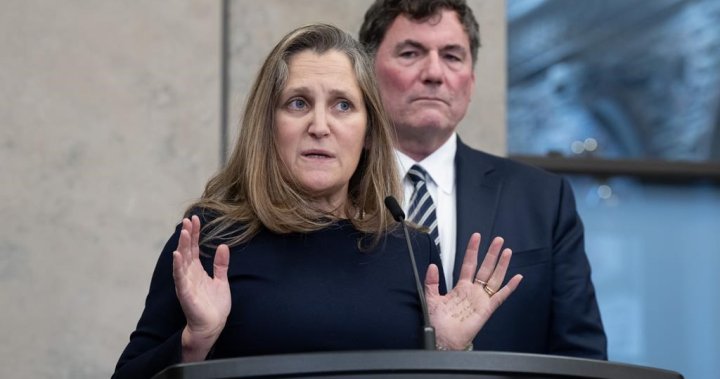Paragraph 1: The Freeland Factor and Internal Divisions
Chrystia Freeland’s abrupt resignation as Finance Minister and subsequent endorsement by some Liberal MPs as a potential successor to Justin Trudeau has ignited a firestorm within the Liberal party. While some view her as a capable leader, others express deep reservations about the timing and manner of her departure. Minister Kamal Khera publicly criticized Freeland’s actions as "reckless and self-serving," accusing her of undermining Trudeau and the government at a time when unity is paramount. This division highlights the underlying tensions within the party and the differing perspectives on Trudeau’s leadership. Khera’s staunch defense of Trudeau, emphasizing his experience and the need to focus on critical issues like the potential return of a Trump administration, underscores the loyalty some MPs still hold for the current Prime Minister.
Paragraph 2: Caucus Discontent and Calls for Change
The Ontario Liberal caucus meeting on Saturday revealed a growing dissatisfaction with Trudeau’s leadership. While some MPs expressed a "strong consensus" for Trudeau to step down, others, including Indigenous Services Minister Patty Hajdu, echoed Khera’s criticism of Freeland. Newly appointed cabinet minister Nate Erskine-Smith’s quick reversal on his support for Trudeau and subsequent complaint about leaked information to the media further exemplifies the internal turmoil. The incident also highlights the sensitivity and pressure surrounding the leadership question, even within private discussions amongst MPs. The leak and subsequent rebuke from a fellow MP underscore the deep divisions within the caucus and the difficulty of having frank conversations about the party’s future.
Paragraph 3: Assessing the Landscape and Regional Dynamics
Freeland’s presence at the Ontario caucus meeting, albeit silent, fueled speculation about her leadership ambitions, although sources close to her maintain that her resignation was solely due to a loss of confidence from Trudeau. The Ontario caucus, representing a significant portion of the Liberal parliamentary group, serves as a key barometer of party sentiment. The absence of many MPs due to a colleague’s wedding highlights the competing priorities and potentially diluted representation at this crucial meeting. Meanwhile, the upcoming Atlantic Canada Liberal caucus meeting signals the spread of these internal deliberations across different regions, particularly notable given the Atlantic caucus’s previous attempt to challenge Trudeau’s leadership. This regional dimension adds another layer of complexity to the leadership question and underscores the national scope of the debate.
Paragraph 4: Alternative Candidates and Shifting Political Positions
While Freeland enjoys support from some, others favor Dominic LeBlanc, the new Finance Minister, as a stronger contender against Conservative Leader Pierre Poilievre. This preference for LeBlanc suggests a strategic calculation based on perceived electability and the need to effectively counter the Conservative opposition. The desire for a "centrist" leader reflects a concern among some Liberals that Trudeau has drifted too far to the left, signaling a potential ideological realignment within the party and a search for a leader who can appeal to a broader electorate. This preference highlights the ongoing debate within the party about its ideological positioning and the best path forward in the face of a resurgent Conservative party.
Paragraph 5: Voices of Dissent and Communication Breakdown
Long-time Liberal MP Rob Oliphant publicly voiced his frustration with Trudeau’s leadership, citing a lack of responsiveness to concerns raised by caucus members. Oliphant’s decision to go public after attempts to communicate privately with Trudeau underscores the breakdown in communication between the leader and some members of his caucus. His claim that Trudeau represents an “obstacle” for the party, even in a progressive riding, suggests that the Prime Minister’s popularity may be waning even among his traditional base. This public airing of grievances reflects a growing boldness among MPs willing to challenge the status quo and push for change.
Paragraph 6: Relaying Concerns and Underlying Mistrust
Michael Coteau, chair of the Ontario caucus, was tasked with communicating the caucus’s views directly to Trudeau. However, skepticism about whether this message would actually reach the Prime Minister, fueled by concerns about interference from Trudeau’s chief of staff, reveals a deep-seated distrust within the party. The decision by some MPs to speak to the media about confidential caucus discussions underscores this lack of trust and a perceived need to circumvent official channels to ensure their concerns are heard. This highlights a dysfunctional internal communication dynamic and a sense among some MPs that their voices are not being adequately represented within the party’s decision-making processes.

